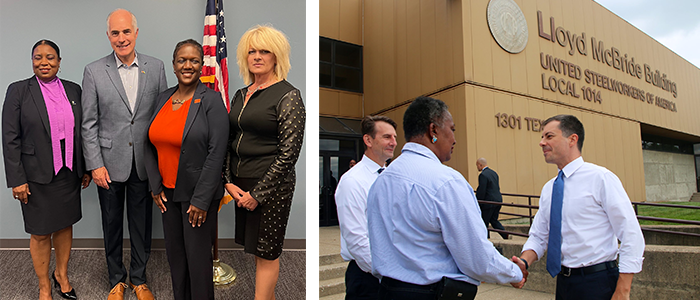USW’s Conway leads labor in asking for job-protecting tariffs to remain
Click here for a printable version of the letter.
Our International President Tom Conway recently sent the Biden Administration comments urging job-protecting tarrifs remain in place on behalf of the Labor Advisory Committee for Trade Negotiations and Trade Policy. The comments state that American workers would clearly be affected if the tariffs were to be lifted.

“Too many U.S. companies have failed to take needed actions to address the threat from the CCP (Chinese Communist Party),” Conway wrote. “Many continue to outsource production, and research and development, undermining U.S. competitiveness and national security interests. They have failed to respond to the signals clearly and continuously sent by the CCP that it is not interested in competing, but in winning and dominating key industries. Our government must act in the national interest to strengthen our economy for the future.”
President Conway leads the Labor Advisory Committee for Trade Negotiations and Trade Policy.
The advisory committee was established to provide information and advice with respect to negotiating objectives and bargaining positions before the United States enters into a trade agreement with a foreign country or countries. The committee advises, consults with, and makes recommendations to the Secretary of Labor and the United States Trade Representative, on issues and general policy matters concerning labor and trade negotiations, operation of any trade agreement once entered into, and other matters arising in connection with the administration of the trade policy of the United States. The LAC is responsible for providing reports on trade agreements to the President, the Congress, and the Office of the United States Trade Representative at the conclusion of negotiations for each trade agreement.
The full text of the letter is below:
June 6, 2022
Ms. Greta Peisch
General Counsel
Office of the United States Trade Representative 600 17th Street, N.W.
Washington, D.C. 20508RE: Request for Comments on the statutory four-year review of actions taken under Section 301 of the Trade Act of 1974, as amended, in the investigation of China’s Acts, Policies, and Practices Related toTechnology Transfer, Intellectual Property, and Innovation.
Dear Ms. Peisch:
On behalf of the members of the Labor Advisory Committee on Trade Policy and Negotiations (LAC), we are requesting that all of the tariffs currently imposed as part of the “List 1” pursuant to the Section 301 investigation of China’s Acts, Policies, and Practices Related to Technology Transfer, Intellectual Property, and Innovation be extended. This request is being made as part of the statutorily required four-year review process.
The members of the LAC represent workers across domestic industry and impacted sectors in the United States. China’s theft of intellectual property (IP), their coercive actions to force the transfer of IP, and their policies to advance innovation in order to serve the goals of the Chinese Communist Party (CCP) has had a corrosive, continuing, and substantial impact on domestic industry and its workforce. The direct effects have been significant alone, but compounded with indirect effects, the impact on the competitiveness of the U.S. economy has been devastating. Workers are clearly an “interested party” under any reasonable interpretation of law, policy, and Congressional intent.
There are broad estimates of the impact of the CCP’s directed predatory actions regarding the acts, policies, and practices identified during the investigation. The direct theft of U.S. IP is estimated to be in the hundreds of billions of dollars annually. But this estimate fails to take account of the lost opportunities, the closed factories, the unemployed workers, and the loss of future opportunities to compete. The CCP’s practices have also advanced their military-civilian fusion, which directly and indirectly threatens our economic and national security interests.
Many of the LAC members represent workers directly employed in making products that compete with, or are impacted by, Chinese products subjected to tariffs imposed pursuant to List 1 (the specific question raised by the USTR that is generating this filing). A substantial portion of the production that occurs in China benefits from CCP policies that include industrial subsidies, two-tiered energy pricing, preferential financing, increased intervention in private markets, performance and joint venture requirements, and a vast array of other policies. China’s non-market and state-led approach has undermined U.S.-based producers and employment. No reasonable economist or policy expert can argue that the proponents’ view of China’s entry into the World Trade Organization has succeeded in abating that country’s predatory and protectionist policies.
The goal of the Section 301 investigation was to carefully enumerate the CCP’s policies and practices, and identify whether it violates the law and U.S. rights and interests. China’s violations were clearly shown, and consultations and negotiations ensued seeking to redress those violations. The bulk of the CCP’s policies identified as part of the 301 investigation, and in other areas, were not addressed as part of the Phase One trade deal. The result has been the continuing imposition of the tariffs. Nothing has changed that would merit unilaterally lifting the tariffs; If anything, President Xi and the CCP have only doubled down on their strategy and approach.
The overall tariffs that have been imposed, and the breadth of the sectors and products involved, were designed to address both the CCP’s policies and practices, and the impact on our economy, producers, and workforce. The tariffs on Lists 1, 2, 3 and 4a all play a part in leveling the playing field, and are an important component of the overall posture with China. The USTR engaged in a targeted approach in both its initial identification of tariffs and subsequent actions to advance U.S. interests. In part, the USTR’s actions were also designed to promote shifts in supply chains in order to limit the economic and strategic benefits inuring to the CCP, and to incentivize U.S. companies to reduce their reliance and dependence on Chinese producers. Coupled with the supply chain disruptions caused by the COVID-19 pandemic, the reorientation of our sourcing is a critical and unaddressed issue.
Too many U.S. companies have failed to take needed actions to address the threat posed by CCP policies. Many continue to outsource production, and research and development, undermining U.S. competitiveness and national security interests. They have failed to respond to the signals clearly and continuously sent by the CCP that it is not interested in competing, but in winning and dominating key industries. Our government must act in the national interest to strengthen our economy for the future.
The members of the LAC are united in the view that the overall level and the individually identified tariffs imposed on China pursuant to the 301 actions should be extended. Many tariffs imposed represent interests directly impacting individual union members. Other tariffs support the overall level of retaliation that is appropriate to respond to China’s unfair, predatory, and protectionist trade policies. Workers in public and service sector jobs, as well as in manufacturing, have seen their jobs put at risk as a result of the impact of the CCP’s policies on producers in their communities who, when injury occurs, often reduce or shutter operations, resulting in untold damage to the tax base and provision of community services.
The request for comments identified two separate filing periods. The above comments are intended to address the totality of the tariffs. If necessary, these comments will subsequently be filed during the second submission period.
Sincerely,
Thomas Conway
Chair
Labor Advisory Committee for Trade Negotiations and Trade Policy
By clicking Sign Up you're confirming that you agree with our Terms and Conditions.
Recent News Articles
Want to Learn More?
See how the USW is making a real difference in our communities and our workplaces.
